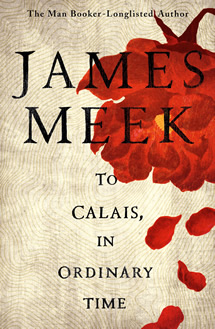Reviewed by Robert Goodman.
By James Meek, Canongate, $29.99
 The past is another country, or in the case of James Meek’s latest book To Calais, In Ordinary Time, it is almost another planet. The book is set in the 14th century and Meek uses an amalgam of old English to create a very definite divide between then and now. Argument rages somewhere on the internet about how accurate or otherwise Meek’s Chaucer-esque language is but it certainly adds to the feel of times long gone.
The past is another country, or in the case of James Meek’s latest book To Calais, In Ordinary Time, it is almost another planet. The book is set in the 14th century and Meek uses an amalgam of old English to create a very definite divide between then and now. Argument rages somewhere on the internet about how accurate or otherwise Meek’s Chaucer-esque language is but it certainly adds to the feel of times long gone.
When the book opens it is 1348, the English have recently defeated the French in the battle of Crécey and hold Calais. English forces are gathering for another battle on French soil but there are also stories of pestilence (or plague or the qualm) coming from the Continent. Serf Will Quate agrees to join a band of bowmen in return for his possible freedom. The group are also joined by a priest, originally from Scotland but looking to get back to his current home in Avignon and later by the Lady Bernadine, the daughter of Will’s lord, on the run from an arranged marriage and towards her ideal of romance Laurence Haket.
The tale builds slowly, revealing the history of the group of bowmen to be one of violence and rape. One of the party, Softly, still keeps a French woman who he captured in the sacking of the city of Mantes. At the same time, Will is being followed by Hab, the swineherd who has a crush on him and who sometimes appears to both Will and Bernadine as his “sister” Madlen. Despite a widespread belief that the plague will not come to England, it does eventually catch up to the group.
To Calais, In Ordinary Time while shining a light on how different life might have been in the 14th Century also shows how some things never change. While he does not labour the point, the public response to the approaching plague is somewhat analogous to current approaches to climate change. First there is denial (it’s a hoax), then there is the repudiation of the global nature of the threat (it won’t happen in England), then a scapegoat is found (in this case the Jews, even though as is pointed out to the character who makes this claim, Jews had been expelled from England years before), and only after it is too late a realisation that no one is safe.
But the similarities and differences with the present are more stark in Meek’s exploration of sexual identity and relationships. Meek gets Shakespearean with male characters dressing up and being mistaken for women and vice versa. His characters discuss and profess love, true and otherwise, and occasionally act on their desires in ways that feel if not modern then at least timeless (things get fairly explicit from time to time, including in a scene involving the King’s mother).
The coming of the plague makes this book feel almost like the current crop of post-apocalyptic tales set in the UK. These books all have scenes of protagonists travelling across empty landscapes dotted with survivors. Places reclaimed by nature are humanity has fallen away:
The sun was two fingers on the brink of the world when they rode out of Hetesbury… Sheep’s fleeces glew gold of the morning and the cattle stinted to graze and beheld the riders going by as if the days of Adam’s kind were long gone… The riders went by… fields of ripening corn that hadn’t been weeded a week…between still, sleeping towns without smoke nor bells.
To Calais, In Ordinary Time is immersive historical fiction. While it takes a while to get into the swing of the language, once that happens, the sights, the smells, the people and the landscapes of medieval England come to life. And as historical fiction often does, Meek shows that while many things have changed, people being people, some things are constant through time.
This and over 450 more reviews can be found on Pile by the Bed.











